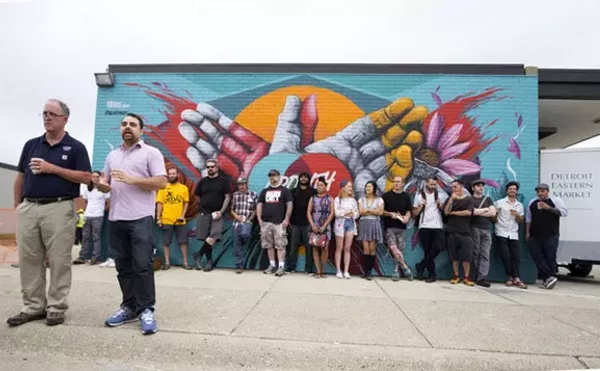
Audio By Carbonatix
[
{
"name": "GPT - Leaderboard - Inline - Content",
"component": "35519556",
"insertPoint": "5th",
"startingPoint": "3",
"requiredCountToDisplay": "3",
"maxInsertions": 100,
"adList": [
{
"adPreset": "LeaderboardInline"
}
]
}
]
The automobile is Detroit’s livelihood, its symbol, its soul. The first traffic light in the country was installed here in 1915. We built the country’s first urban below-grade freeway — the Davison — in 1942. We got the world’s first traffic tunnel between two countries.
We Detroiters love our cars. But are we ready to share them?
Motor City CarShare thinks so. The nonprofit, founded in July, is dedicated to reducing dependency on the personally owned car. In doing so, the group aims to improve neighborhood livability, increase public transit use, promote economic development, reduce parking demand and promote healthier alternative fuel options. The project is supported by the State of Michigan Energy Office, EcoVillage Detroit and WARM Training Center.
“I was inspired by other car-share projects,” says Jacob Corvidae, one of the group’s founders. “Also, I have a personal commitment not to own a car, and found that more and more I needed one occasionally to get around. Plus, I know that we don’t have a completely functioning transportation system in this town, and I was excited to explore other possibilities.”
Car sharing is like a short-term car rental for those who need one only for occasional use. The Swiss started it in 1987, and the idea hit North America in 1993 by way of Quebec City. The Web site carsharing.net reports that, in 2004, 15 car-sharing programs in the United States operated 939 vehicles and had an estimated 61,651 members. The site claims that car sharing will save you thousands of dollars if you drive less than 7,500 miles a year. AAA says the cost of new-car ownership averages about $8,410 per year, or $23 a day.
“Over the next five years, I think you’ll see car sharing serving the close-in neighborhoods of most American cities,” says Dave Brook, who in 1998 founded Carshare Portland, the first commercial car-share company in the United States. “And you’ll start to see car sharing start to make a dent in replacing second-car ownership, especially in households where the second car is only used a couple of times a month.
“As cities become more densely populated and their downtowns are revitalized with housing, you’ll see car sharing become a way of life for a substantial number of people.”
MCCS is a membership-based community effort. Those who join pay a $75 membership fee — $50 is refunded when membership is ended — and must reserve a car 24 hours in advance by phoning or using the group’s Web site (motorcitycarshare.org).
Insurance, gas and maintenance are included in the rental fees. Members must be at least 25 years old and have a good driving record — at least 3 years of no at-fault accidents or moving violations.
Insurance is the most complex component of running a car-share program. When there’s an accident, the driver is billed $500, regardless of fault. MCCS currently has only one car to share, but is working on getting a second.
“We’re not just renting to the general public; this is a membership-based organization,” Corvidae says. “We have a set number of drivers with checked records. It’s similar to any corporate car account. Nonetheless, those higher insurance fees have to be reflected in our rates.”
Still, the rates are slightly cheaper than those of metro Detroit’s commercial for-profit car-share, Via Car (via-car.com). MCCS offers three plans: simple, part-time and commuter. Each plan charges $.25 a mile and ranges from $1.25/hour to $3.25/hour. Full-day rental is available, depending on the plan. The Part-time and Commuter plans also have monthly charges of $15 and $25, respectively.
“The rates are high, but it accurately reflects how much it costs to operate a car, even on a usage basis,” says CarShare member Kevin Bingham, who has used the car five times in the past two months. Bingham’s own vehicle is unreliable; he says the MCCS car is not. “My car breaks down quite frequently, so it’s a nice supplement to get to the suburbs or wherever I need to go.”
The MCCS car is an unmodified 1996 4-door Volkswagen Passat, and comes with a child-safety seat and window scraper in the back seat. The vehicle has a hint of rust, giving the moderately worn Passat a humbled look in a crowded parking lot of gas-guzzling SUVs. As a shared car, its only discernible features are the biodiesel stickers on all four sides and a faint smell of burnt vegetable oil, a product of the fuel. The Passat is maintained by volunteer Fidel Coleman — who also is a collector and modifier of Volkswagens — of Steve’s European Auto in Waterford. Corvidae says Coleman is an avid MCCS supporter.
The MCCS is now acquiring an ethanol-fueled van to help people who need more room. A trailer is already available.
One-third of Detroit residents don’t own a car, and given the city’s low-rent transit system, CarShare offers a new option.
“It’s not my opinion that the car share is something everyone should use,” Corvidae says. “What it’s good for is enabling someone to get rid of a second car, or their only car if they are interested in living a more car-free existence. We need improved transit, and car shares are a piece of the puzzle.”
Another piece is getting biodiesel — a domestic, renewable fuel for diesel engines derived from such natural oils as virgin soybean — into Michigan’s pumps. It’s the first and only alternative fuel to complete the evaluation of emissions and health effects by the Environmental Protection Agency under the Clean Air Act. Carbon monoxide emissions are 48 percent lower in biodiesel than regular diesel fuel. Even a small concentration of biodiesel greatly reduces vehicle emissions. Most importantly, using the fuel won’t void the engine warranty of any major U.S. diesel engine manufacturer.
This year, Minnesota enacted the first statewide law requiring the state’s diesel fuel to include 2 percent biodiesel. A similar act, House Bill 4235, is now before the Michigan Legislature.
“The idea is that the mandate would go into effect as soon as we start producing some certain number of millions of gallons of biodiesel in the state,” Corvidae says. “So, instead of it being an environmental bill, it’s a jobs-creation bill supporting local agriculture. You get the farmland getting a new source of revenue, and we get less dependent on imported fuel.”
Biodiesel isn’t currently available in the city of Detroit, but there are a few stations that carry it in the metro area — some are in Taylor, Ypsilanti and Ann Arbor.
For more locations, check out the alternative fuel locator Web site, afdcmap.nrel.gov/locator/locatepane.asp.
Dustin Walsh is Metro Times editorial intern. Send comments to letters@metrotimes.com




